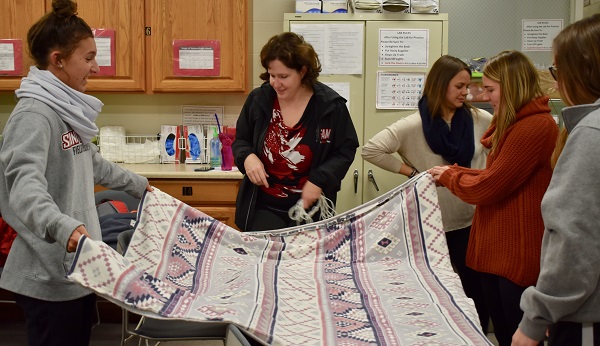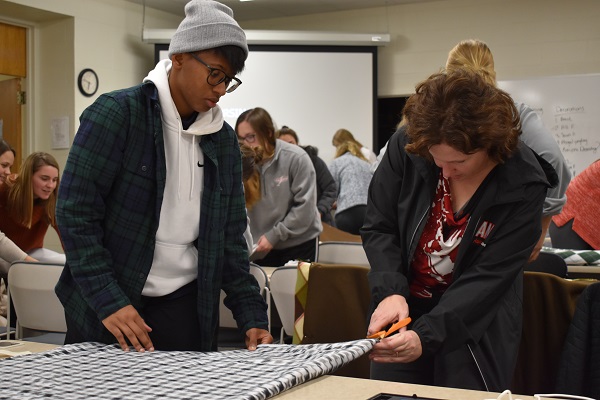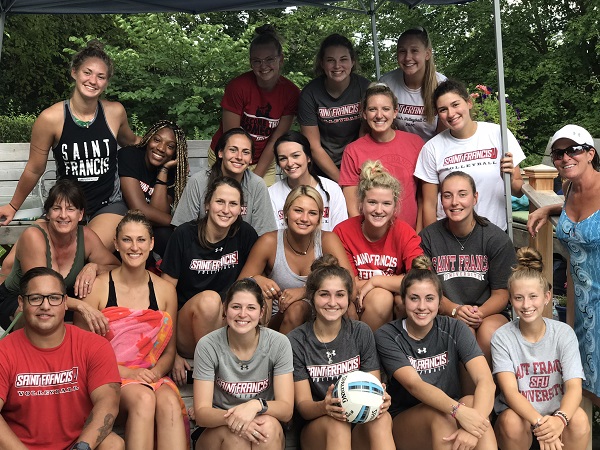Faith and Franciscanism in Athletics
The Catholic Franciscan faith creates the foundation of all things Saint Francis University, including the University’s approach to collegiate athletics.
Saint Francis University proudly has a team chaplain for each of its 22 Division I intercollegiate athletic teams, as well as its marching band and cheerleading programs. SFU is one of the only schools in the nation that has a Sports Chaplain program, and the only one where every program has its own chaplain to represent their respective team.
"Student-Athlete Development’s Chaplain Program is designed to round out the overall experience and well-being of our student-athletes, said Jaime Lipski, Associate Director Student Athlete Development. “By focusing specifically on faith and service, it offers our students another avenue to pursue and embody the mission of the University."
Throughout the academic year, Saint Francis University team chaplains provide personal and spiritual support to the student-athletes, coaches, and staff. The chaplain's role is designed to provide a healthy and balanced perspective to their team through spiritual encouragement, vision, and leadership development.

Chaplains maintain a strong relationship with the coach, coordinating with them activities to help integrate the University's Catholic and Franciscan character for athletes and staff. In addition to community service events, the chaplains organize Lunch-n-Learn Programs, educational seminars that help athletes grow spiritually, mentally, physically, and socially. These programs help prepare our student-athletes for success upon graduation.
“The opportunity I have been given to serve the team is a blessing,” said Dr. Nickole George, women’s field hockey chaplain and Associate Professor or Nursing. “It has allowed me to connect more fully with student athletes, coaches, and the athletic department staff—all important parts of our campus community. I bring my family to team events so that they can see strong young women of different faiths and beliefs come together to grow, challenge and support one another, and always be an example of sportsmanship both on and off the field.”
Our Athletic Mission
An interview with Father Joseph Lehman, T.O.R., former Vice President for Mission Integration
Why is Faith in Athletics important here at SFU?

It's important because even though athletics in general is a secular activity, NCAA Athletics is a value-driven enterprise much like religion in general and Saint Francis University in particular. NCAA student-athletes are taught and encouraged to pursue excellence in athletics and academics, to embrace integrity and sportsmanship, and to be respectful and inclusive of others (NCAA core values). In a similar vein, faith-based institutions like Saint Francis University are driven by our Franciscan values and Catholic tradition. So even though faith and athletics are different in many ways, what unites them is their common emphasis upon core values that overlap.
Faith in Athletics is also important because Saint Francis University is a microcosm of the larger Church, which also values the relationship between faith and athletics. In recent years, Pope Francis and the Catholic Church are seeking ways to recognize and build upon the relationship between faith and sports which strongly influence culture everywhere. See iSport at the Service of Humanity.
In addition, St. Paul the Apostle occasionally used sports metaphors in his letters and exhortations to draw attention to an affinity between athletics and the Christian life. He encouraged Timothy to "Compete well for the faith" (1 Timothy 6:12a). He admonished the Christians living in Galatia, "You were running well; who hindered you from following the truth? (Galatians 5:7). Reflecting on his own faith journey he wrote, "I have competed well; I have finished the race; I have kept the faith" (2 Timothy 4:7) and "I continue my pursuit toward the goal, the prize of God’s upward calling, in Christ Jesus" (Philippians 3:14). Finally, in his reflections to the Corinthians about living the Christian life, Paul combines the images of running a race, athletic discipline, boxing, and training properly for a sporting event (1 Corinthians 9:24-27). All of these athletic references revealed a balance and connection between our physical bodies and the spiritual souls.
How do we weave our Catholic/Franciscan values into our athlete's everyday lives?
First of all, we seek to recruit and retain coaches, administrators, and staff within the Athletics department who believe in and embody our Catholic Franciscan values. When student-athletes see those values being lived out daily by their coaches and mentors, they are more likely to integrate those values into their own lives.
Second, we also strive to recruit student-athletes who are a good "mission fit" for Saint Francis University. This means we strive to recruit student-athletes who value earning an academic degree and not just playing intercollegiate athletics. We also recruit student-athletes who are interested in attending a faith-based university that strives to be Catholic and Franciscan in everything we do.
Finally, we also strive to intentionally engage our student-athletes in activities that directly correspond to our mission and values. For example, athletic teams regularly engage in community service activities to develop a "heart for service" (Mission Statement) and concern for the "poor and needy" (Franciscan value #5). Teams and team chaplains often pray together before competition because we are a "community of faith and prayer" (Franciscan value #6). And while not all team chaplains are Franciscan friars, to the degree that team chaplains embody our Franciscan values, the teams they serve benefit from a "Franciscan presence" (Franciscan value #8). Teams that recruit international student-athletes and/or occasionally compete internationally (men's and women's basketball) embrace a "global vision" (Franciscan value #4). And since all teams strive to show respect - an NCAA core value - they are also striving to show "respect for the uniqueness of individual persons" (Franciscan value #3).
What are chaplains, and what type of faith-based support do they provide to students/teams?

On one level, a team chaplain is a volunteer who is a person of faith who both understands the University's mission and values and is interested in becoming more engaged in student life. The chaplain's primary responsibility is to develop supportive relationships with members of the team including the head coach and coaching staff. Key characteristics to building and sustaining such relationships are availability, accessibility, and trust. Hence, being present to the team is essential for building such relationships. This presence is then strengthened by listening and engaging in conversations, being of service to the team, as well as offering a prayer or providing words of inspiration before or after competitions and training.
When team chaplains first emerged at Saint Francis University nearly twenty years ago, they were all Franciscan friars. Yet over the years, many lay persons have also served as team chaplains. Hence, the composition of team chaplains at SFU today is very diverse. Some are members of the faculty while others are administrators or staff; some are men and some are women; some are Roman Catholic and others are Protestant.
Sports chaplains are not unique to Saint Francis University. During the 2018 NCAA men's basketball tournament, the Loyola Chicago University Rambler's team chaplain - Sister Jean Schmidt - a 98-year old nun who has served as the Rambler's chaplain since 1994 received significant media coverage as the Ramblers made it all the way to the Final Four in San Antonio. Within the Northeast Conference, Mount St. Mary's University also has team chaplains. Yet unlike SFU, the chaplains at MSM are all seminarians from MSMU's sister institution, Mount St. Mary Seminary. Two other Franciscan universities - Neumann University near Philadelphia and Franciscan University in Steubenville, OH - also have a team chaplaincy program. Team chaplains can also be found at many other secular and faith-based universities across the U.S. Several universities now offer graduate programs in sports chaplaincy and ministry including Baylor University, Liberty University, and Cardiff University.
Beyond the United States, sports chaplains have also been emerging internationally, especially across Europe and Australia. In a recently published book titled Sports Chaplaincy: Trends, Issues, and Debates edited by Andrew Parker, Nick J. Watson, and John B. White (2016), much scholarship and research is devoted to this burgeoning field.
Finally, in the Preface of this book, John Swinton - Chair of Divinity and Religious Studies at the University of Aberdeen, UK - refers to chaplains of various stripes (healthcare, prison, sports) to be people of the heart, which he refers to as the seat of human affectivity and activity. And it is from within our hearts that humanity seeks to love, interact, and be in communion with the world beyond us, including God. Hence, according to Swinton, "in a world that can sometimes be quite heartless, sports chaplains are called to become people of the heart who help others re-imagine sports as a practice of the heart as well as the body" (p. xviii).
Can you give a quick summary of what the Fellowship of Christian Athletes represents?
Sure. FCA is an international and interdenominational Christian sports ministry program which strives to engage coaches and athletes on the professional, collegiate, high school, and youth levels to utilize their love for sports and their Christian faith to evangelize others. It does so by providing training and resources for Christian athletes to help them and others grow spiritually so they can make a difference for Christ. It is the largest ministry program of its kind in the United States.
The FCA sponsors groups on college campuses across the country including Saint Francis University. The FCA has been actively present here for many years and currently meets weekly on Wednesday nights. The group is moderated by several SFU staff members and has an average attendance of 40 to 50 student athletes each week.